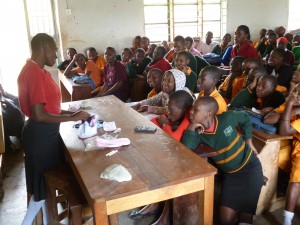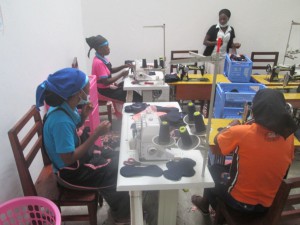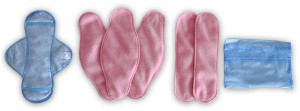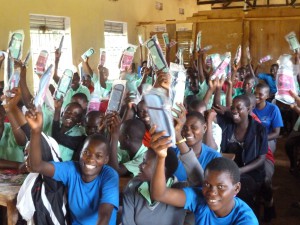 Coping with the menstrual cycle has long been a challenge to achieving equal opportunities for girls in African schools. Girls find it difficult to cope with the long school day during their periods, when they have no money to buy sanitary pads. Discussing the problem is also taboo as many girls have been led to believe that periods have to be borne in silence as they are a punishment from God for Eve’s misdeeds in the Garden of Eden. As a result, many girls absent themselves from school during this time of the month and miss up to 20% of their schooling. Menstruation remains a major cause of lower educational outcomes for girls in the school system.
Coping with the menstrual cycle has long been a challenge to achieving equal opportunities for girls in African schools. Girls find it difficult to cope with the long school day during their periods, when they have no money to buy sanitary pads. Discussing the problem is also taboo as many girls have been led to believe that periods have to be borne in silence as they are a punishment from God for Eve’s misdeeds in the Garden of Eden. As a result, many girls absent themselves from school during this time of the month and miss up to 20% of their schooling. Menstruation remains a major cause of lower educational outcomes for girls in the school system.
It is an issue that the Humanist Schools have been trying to address from within their limited resources. The Isaac Newton High Schools keep a stock of conventional sanitary pads which girls can request from the school nurse or boarding matron when they need them. At Mustard Seed School girls in boarding are expected to arrive at the start of each term with a supply of sanitary pads but, to date, there has been no school provision for when girls run out.
Disposal of conventional pads has also been a headache for the schools. The pads are bulky and girls tended to drop them into the pit latrines, which considerably shortens the life of the pit and imposes additional rebuilding costs. To address the disposal problem UHST has helped each school to acquire incinerators where the pads can be burnt. Unfortunately many girls still drop pads in the latrine, as they are embarrassed to carry used pads to the incinerator.
 Thanks to a fundraising effort by Central London Humanists, which raised £2000 in their Winterval Quiz in December 2013, a new and more ecologically sound solution has been found to help the schools. The group found a new Ugandan social company, Afripads.com, making re-useable sanitary pads designed for African conditions. The pads are manufactured from local materials, by local Ugandan women, giving them the opportunity to generate an income and send their kids to school. The pads are designed to be washed, dried and re-used for up to a year. They are supplied as a personal menstrual kit, which provides schoolgirls with affordable, environmentally-friendly (washable) menstrual protection for up to 1 year at approximately 20% of the total cost of a one-year supply of commercial sanitary napkins. The replacement cost is €5 per girls per year.
Thanks to a fundraising effort by Central London Humanists, which raised £2000 in their Winterval Quiz in December 2013, a new and more ecologically sound solution has been found to help the schools. The group found a new Ugandan social company, Afripads.com, making re-useable sanitary pads designed for African conditions. The pads are manufactured from local materials, by local Ugandan women, giving them the opportunity to generate an income and send their kids to school. The pads are designed to be washed, dried and re-used for up to a year. They are supplied as a personal menstrual kit, which provides schoolgirls with affordable, environmentally-friendly (washable) menstrual protection for up to 1 year at approximately 20% of the total cost of a one-year supply of commercial sanitary napkins. The replacement cost is €5 per girls per year.
 At the end of May, Afripads sent their team around the three Humanist secondary schools. In each school they taught the girls how to use the pads and answered the girls’ many questions about menstruation, which revealed high levels of ignorance about the processes the girls were experiencing. At the top of this article is a picture of the trainers talking to the girls. The fourth photograph below shows the girls proudly waving their new kits.
At the end of May, Afripads sent their team around the three Humanist secondary schools. In each school they taught the girls how to use the pads and answered the girls’ many questions about menstruation, which revealed high levels of ignorance about the processes the girls were experiencing. At the top of this article is a picture of the trainers talking to the girls. The fourth photograph below shows the girls proudly waving their new kits.
Girls are delighted by this initiative, which will enable them to participate more fully in school. Senior staff are confident that the girls will use the pads as intended and that girls’ attendance will rise substantially. This has been a wonderful initiative by Central London Humanists. The money they raised made the whole project possible and paid for mentrual kits for all the girls at Isaac Newton High School, Masaka and Mustard Seed School, Busota. UHST provided additional funds to allow the girls from Isaac Newton High School, Mpigi to be included.
Below are some of the comments made by girls following the visit of the Afripads team to their school:
Zaituni, aged 13, in Senior 2 “I thought it was morally wrong to reveal that a girl has gone for the Menstrual period. I never got chance to hear about it before this day and in a public meeting of this kind. I am very delighted and feel as normal as the boys.”
Judith, aged 14, in S2 “I always felt guilt when the periods came. Using tissue papers was never satisfying and always looked at the whole school community in fear hence forging sickness to escape coming to school.”
 Juliet, aged 17 in S4 “I am relieved to hear testimonies from adult women that they too go through the same experiences we go through yet they look normal and happy.”
Juliet, aged 17 in S4 “I am relieved to hear testimonies from adult women that they too go through the same experiences we go through yet they look normal and happy.”
Catherine, aged 15 in S3 “I have always used rugs during my periods which make me uncomfortable and keep me worried of the hygiene. I was aware of the good sanitary pads but my parents could not afford to buy them. Thanks for this wonderful donation and making us safe and comfortable.”
Robinah, aged 17 in S5 “We were told all sorts of lies that a woman was condemned in the bible for making Adam eat the forbidden fruit in the garden so that all women now pay the price by suffering monthly periods. The talk has opened my mind to the reality and made me a proud young woman assured of bearing children.”
Immaculate, aged 14 in S2 “I have always performed below my capacity at school since I always missed 3 weeks of school out 12 weeks of each term. I have not been sure of my privacy during Menstrual periods since I always used to pad myself with cotton wool that looked protruding and heavy.”
Menstrual challenge to girls’ educational achievement
Posted: June 3, 2014 by Steve Hurd
It is an issue that the Humanist Schools have been trying to address from within their limited resources. The Isaac Newton High Schools keep a stock of conventional sanitary pads which girls can request from the school nurse or boarding matron when they need them. At Mustard Seed School girls in boarding are expected to arrive at the start of each term with a supply of sanitary pads but, to date, there has been no school provision for when girls run out.
Disposal of conventional pads has also been a headache for the schools. The pads are bulky and girls tended to drop them into the pit latrines, which considerably shortens the life of the pit and imposes additional rebuilding costs. To address the disposal problem UHST has helped each school to acquire incinerators where the pads can be burnt. Unfortunately many girls still drop pads in the latrine, as they are embarrassed to carry used pads to the incinerator.
Girls are delighted by this initiative, which will enable them to participate more fully in school. Senior staff are confident that the girls will use the pads as intended and that girls’ attendance will rise substantially. This has been a wonderful initiative by Central London Humanists. The money they raised made the whole project possible and paid for mentrual kits for all the girls at Isaac Newton High School, Masaka and Mustard Seed School, Busota. UHST provided additional funds to allow the girls from Isaac Newton High School, Mpigi to be included.
Below are some of the comments made by girls following the visit of the Afripads team to their school:
Zaituni, aged 13, in Senior 2 “I thought it was morally wrong to reveal that a girl has gone for the Menstrual period. I never got chance to hear about it before this day and in a public meeting of this kind. I am very delighted and feel as normal as the boys.”
 Juliet, aged 17 in S4 “I am relieved to hear testimonies from adult women that they too go through the same experiences we go through yet they look normal and happy.”
Juliet, aged 17 in S4 “I am relieved to hear testimonies from adult women that they too go through the same experiences we go through yet they look normal and happy.”
Judith, aged 14, in S2 “I always felt guilt when the periods came. Using tissue papers was never satisfying and always looked at the whole school community in fear hence forging sickness to escape coming to school.”
Catherine, aged 15 in S3 “I have always used rugs during my periods which make me uncomfortable and keep me worried of the hygiene. I was aware of the good sanitary pads but my parents could not afford to buy them. Thanks for this wonderful donation and making us safe and comfortable.”
Robinah, aged 17 in S5 “We were told all sorts of lies that a woman was condemned in the bible for making Adam eat the forbidden fruit in the garden so that all women now pay the price by suffering monthly periods. The talk has opened my mind to the reality and made me a proud young woman assured of bearing children.”
Immaculate, aged 14 in S2 “I have always performed below my capacity at school since I always missed 3 weeks of school out 12 weeks of each term. I have not been sure of my privacy during Menstrual periods since I always used to pad myself with cotton wool that looked protruding and heavy.”
Category: News